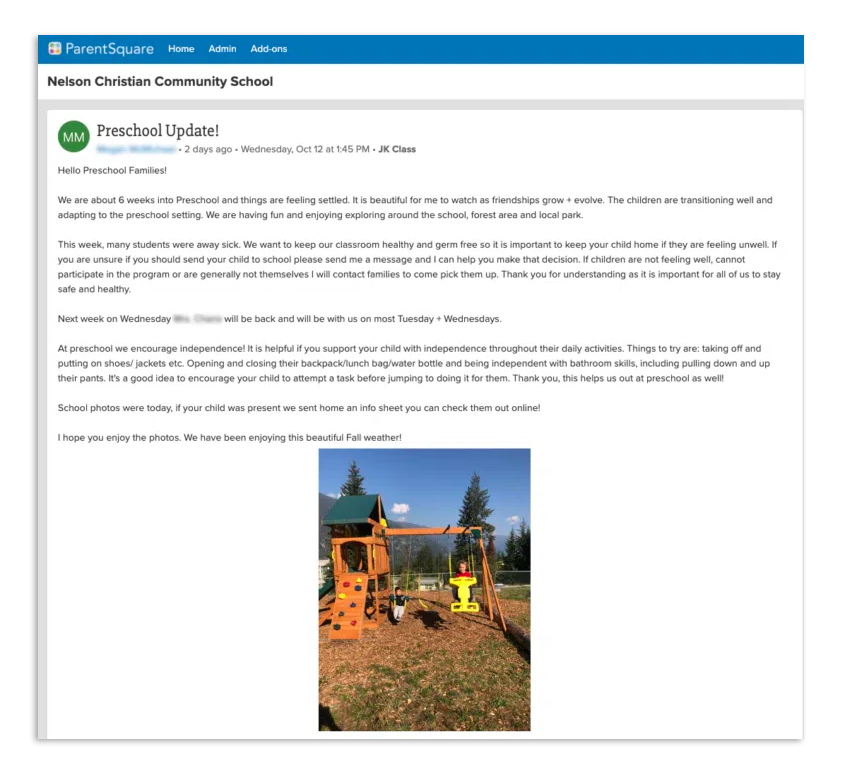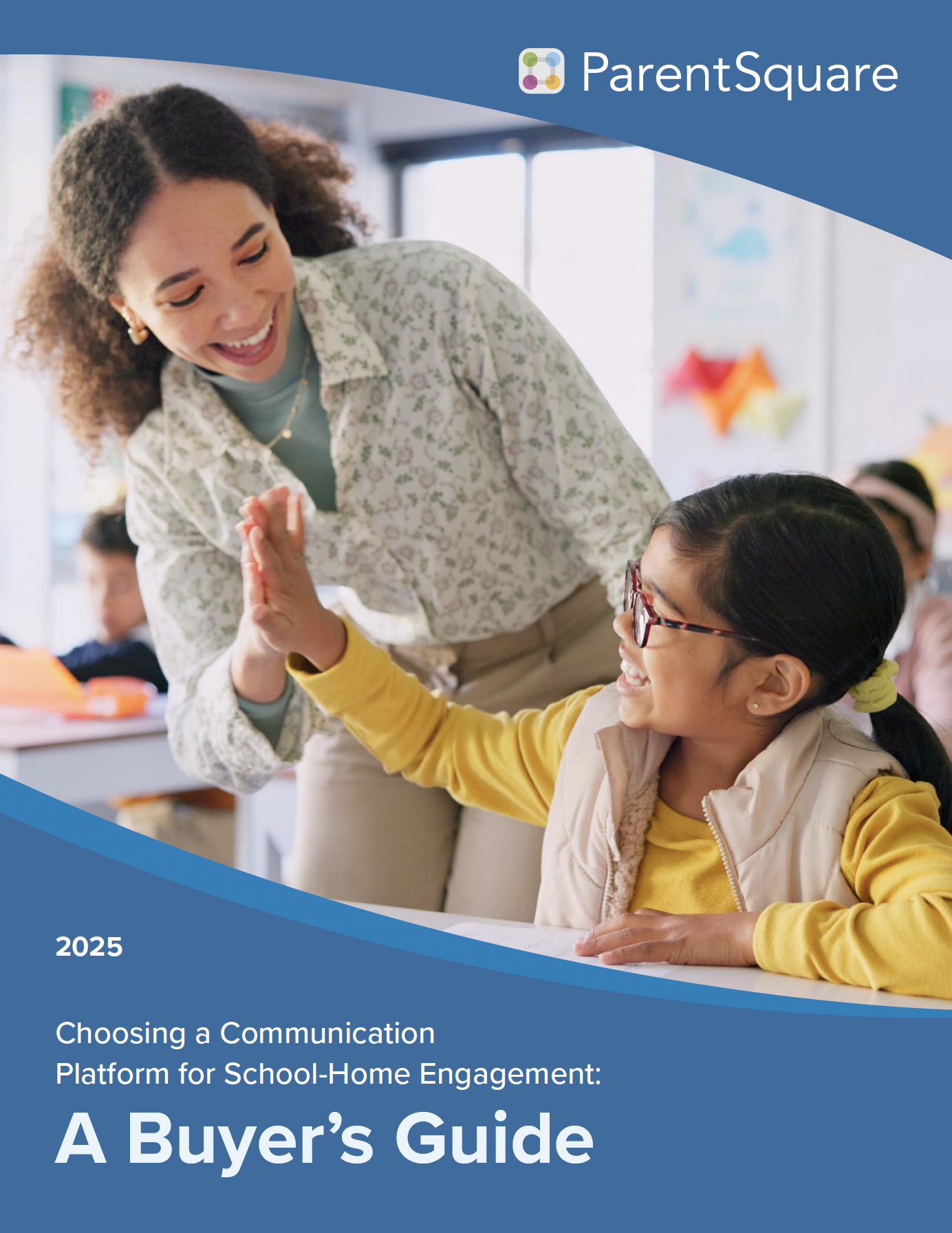
Educators play a vital role in shaping a student’s education, but the partnership between educators and families is equally crucial for a child’s success. When parents and guardians actively engage in their child’s learning, it creates a powerful support system that enhances academic growth and fosters a love for learning. Just as students need to be directed in the classroom, it can be helpful to talk to families about how they can best support their child. After all, children don’t come with a user’s manual!
In this blog post, we will explore six strategies for educators to encourage and empower parents and guardians to play an active role in supporting their child’s learning journey. We also include content you can share directly with families, including…
- Top 10 Ways to Help Your Child Succeed at School
- 15 Questions to Ask Your Child at the Dinner Table
- 15 Questions to Ask Your Child’s Teacher
Let’s jump in!
6 Strategies for Empowering Families
1. Establish clear lines of communication
Open and consistent communication is the foundation of productive parent-teacher partnerships. Set the stage early by welcoming families at the beginning of the school year and clearly communicating your expectations for parental involvement. Utilize a variety of communication channels, such as newsletters, emails, parent-teacher conferences or online platforms, to keep families informed about their child’s progress, upcoming assignments and classroom happenings. By establishing clear lines of communication, you create a supportive environment for collaboration.
2. Provide clear learning objectives and strategies
Parents and guardians may feel unsure about how to help their child with learning if they lack clarity about learning objectives or appropriate strategies. Clearly communicate the learning goals and outcomes to families, explaining the skills and knowledge students are expected to acquire. Offer guidance and resources on effective learning strategies that families can use at home to reinforce classroom learning. This can include suggestions for reading together, practicing math skills, or engaging in educational games and activities. By providing specific guidance, families feel empowered and equipped to support their child’s learning.
3. Offer education workshops and resources
Education workshops are an effective way to provide parents and guardians with valuable insights, strategies and resources to support their child’s learning. Collaborate with colleagues, community organizations or specialists to offer workshops on topics such as literacy, math strategies, study skills or fostering a growth mindset. Provide handouts, online resources or recommended reading materials that families can access at their convenience. By offering education opportunities, you empower families with the knowledge and tools to actively engage in their child’s learning.
4. Encourage home-school collaboration
Promote a culture of collaboration between home and school by actively seeking input and involving families in decision-making processes. Encourage parents and guardians to share their insights, experiences and concerns regarding their child’s education. Ask for their input on classroom activities, projects or field trips. Consider organizing family volunteer opportunities within the classroom or for special events. By valuing and involving families as partners in their child’s education, you foster a sense of ownership and investment that translates into increased support for learning.
![]() Polls and surveys are excellent ways for teachers and school administrators to hear what’s working and what could be improved. They are also a great way to make families know that you value their voice. ParentSquare makes it easy to run school surveys for parents and guardians by offering pre-built templates, multi-language versions, and pre-populated fields.
Polls and surveys are excellent ways for teachers and school administrators to hear what’s working and what could be improved. They are also a great way to make families know that you value their voice. ParentSquare makes it easy to run school surveys for parents and guardians by offering pre-built templates, multi-language versions, and pre-populated fields.

5. Celebrate and recognize involvement
Acknowledge and celebrate families’ efforts in supporting their child’s learning. Publicly recognize and appreciate involvement through newsletters, social media shout-outs or appreciation events. Showcase student work or projects completed with parental support. By celebrating family involvement, you create a positive feedback loop that encourages ongoing engagement and motivates other parents and guardians to participate.
6. Foster a welcoming environment
Create a warm and welcoming classroom environment that encourages families to actively participate. Host open houses, back-to-school nights or family engagement events where parents and guardians can familiarize themselves with the learning environment and get to know other families. Create opportunities for informal conversations and connections by setting aside time before or after school for brief parent-teacher interactions. By fostering a welcoming environment, you build a foundation of trust and collaboration that encourages families to feel comfortable engaging in their child’s learning.
![]() We know that circumstances are different for each family and not everyone has the ability to volunteer in the classroom during the school day. That’s why we encourage ParentSquare users to share regular updates through the platform to parents and guardians. They can see what their child is accomplishing in class and feel like they are connected, despite work or family obligations that may keep them from participating.
We know that circumstances are different for each family and not everyone has the ability to volunteer in the classroom during the school day. That’s why we encourage ParentSquare users to share regular updates through the platform to parents and guardians. They can see what their child is accomplishing in class and feel like they are connected, despite work or family obligations that may keep them from participating.

When educators and families work together, students benefit from a cohesive support system that enhances their learning and overall success. By following these strategies, educators can empower parents and guardians to actively engage in their child’s learning journey.
We love sharing tips, strategies and insights for educators to improve and enhance their day at school. But we are also passionate about helping educators better support their school families! The sections below are designed to be copied, pasted, updated to fit your needs and shared with parents and guardians. Be sure to add in your own personalized details, like the dates and times for back to school events.
Top 10 Ways to Help Your Child Succeed at School
- Attend back to school events and meet your child’s teachers
- Establish a consistent routine at home
- Participate in committees and parent-teacher organizations
- Ask your child questions about their school day (15 shared below!)
- Read newsletters and updates from your child’s school
- Volunteer in your child’s classroom
- Display your child’s work at home
- Attend parent-teacher conferences and ask questions (15 shared below!)
- Celebrate your child’s accomplishments
- Encourage curiosity and a growth mindset
15 Questions to Ask Your Child at the Dinner Table
These questions are designed to engage children of different ages and encourage conversation about their school experiences. Adjusting them based on your child’s specific interests and experiences can make the conversation even more enjoyable and informative!
Elementary:
- What was the best part of your day at school today?
- What games did you play during recess or break time?
- Did you learn something new that you found exciting?
- Who did you sit with during lunchtime? What did you talk about?
- What subject did you enjoy the most today? Why?
Middle:
- Is there anything challenging you’re dealing with in any of your classes? How can we help?
- Did you work on any group projects today? How did it go?
- Were there any surprises or unexpected events that happened at school?
- Did you get a chance to participate in any extracurricular activities or clubs today?
- What’s something you learned today that you didn’t know before?
High:
- How are your current classes challenging or engaging you?
- Did you have any discussions or debates in class that got you thinking?
- What are your thoughts on the latest project or assignment you’re working on?
- Have you considered joining any new clubs or trying out for any sports teams?
- Is there a particular subject you’re finding more interesting lately? Why?
15 Questions to Ask Your Child’s Teacher
These questions can vary depending on the child’s specific needs, but they provide a starting point for parents and guardians to engage with teachers and support their child’s success in school.
Elementary:
- What are my child’s strengths and areas they could improve on academically and socially?
- How can I reinforce what my child is learning in the classroom at home? Any specific resources or strategies?
- What can I do to support my child’s enthusiasm for learning?
- Are there any concerns or issues you’ve noticed that I should be aware of to better help my child?
- What methods of communication work best for you? How often should I check in about my child’s progress?
Middle:
- How can I assist my child in managing their workload and balancing extracurricular activities?
- Are there any specific study habits or organizational skills my child should focus on to succeed in your class?
- What are the major upcoming projects or assignments my child needs to prepare for?
- How do you handle grading and feedback? How can I help my child use feedback constructively?
- Are there any resources or tutoring options available if my child needs extra help in your subject?
High:
- What can I do to help my child prepare for college or post-secondary education? Any specific advice or guidance?
- How does your class prepare students for standardized tests or exams?
- Are there any internship opportunities or programs related to your subject that my child could explore?
- Can you recommend any advanced or supplementary materials to further challenge my child’s understanding of the subject?
- How do you handle student concerns or stress related to academic performance?







